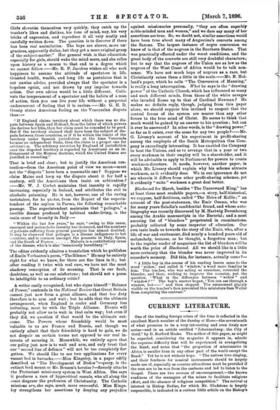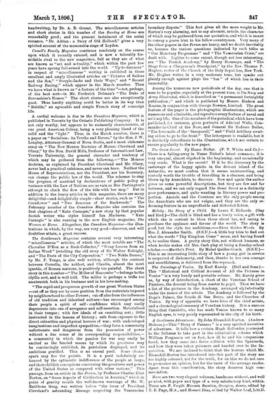CURRENT LITERATURE.
One of the leading foreign crises of the time is reflected in the excellent March number of the Sunday at Home—the seventeenth of what promises to be a very interesting and even lively new series—and in an article entitled "Johannesburg: the City of Gold," by D. Burford Hooke. The author of this paper, as might be expected, considering the magazine it appears in, admits the supreme difficulty that will be experienced in evangelising the Rand, and notes that "the proportion of missionaries in Africa is smaller than in any other part of the world except the Rand." Yet he is not without hope. "The natives love singing, and their fondness for musical instruments should be largely made use of, especially as counter-attractions must be provided if the men are to be won from the canteens and led to listen to the Gospel. There are two sources of encouragement,—the known readiness of the managers of the mines to facilitate religious effort, and the absence of religious competition." The revival of interest in Bishop Butler, for which Mr. Gladstone is largely responsible, is indicated in a curious little article on the Bishop's handwriting, by Dr. A. B. Grosat. The miscellaneous articles and short stories in this number of the Sundae at Home are
remarkably good ; and the present instalment of the serial romance, "Dr. Adrian : a Story of Old Holland," gives a very spirited account of the memorable siege of Leyden.
Cassell's Family Magazine continues resolutely on the course upon which it recently entered, and is now a tolerably for-
midable rival to the new magazines, full as they are of what are known as "art and actuality," which within the past few years have sprung full-armed into the world. " Up-to-dateness " in respect of " miscellaneous " writing is exhibited in three excellent and amply illustrated articles on "Pictures of Sailors and the Sea," " Steeple-Jacks and their Ways," and " Recent Railway Racing," which appear in the Ilfareh number. Then we have what is known as "a feature of the time "—not, perhaps, of the beat sort—in Mr. Frederick Dolman's "The Duke of Devonshire's Homes." The short stories are also exceptionally good. Thus hardly anything could be better in its way than " Babille," an agreeable and simple French story of conscript life.
A cordial welcome is due to the Canadian Magazine, which is published in Toronto by the Ontario Publishing Company. It is
not only worthy, but appears to be eminently characteristic, of our great American Colony, being a very pleasing blend of the solid and the "light." Thus, in the March number, there is a paper on " Socialism : its Truths and Errors," by the Hon. J. W.
Longley, Attorney-Genera of Nova Scotia, and a most elaborate essay on "The New Monroe Doctrine of Messrs. Cleveland and Olney," by the Hon. David Mills, Professor of International Law, Toronto University, the general character and tendency of which may be gathered from the following,—" The Monroe doctrine, as explained by President Cleveland and Mr. Olney, never had a practical existence, and never can have. Neither the House of Representatives, nor the President, nor his Secretary, can change the public law of the world. The schemes to stay the progress of mankind by declarations of public policy at variance with the Law of Nations are as vain as Mrs Partington's attempt to check the flow of the tide with her mop." But in addition to the heavy articles in this magazine, there are many delightful—and delightfully simple-short stories, such as " The Cornflower" and " Two Beauties of the Backwoods." The
February number of the Canadian Magazine also contains the first chapters of "Kate Carnegie," a, new story by that popular Scotch writer who styles himself Ian Maclaren. "Kate Carnegie" is also running in the new English magazine, The Woman at Home. Altogether, the Canadian Magazine—the illus- trations in which, by the way, are very good—deserves, and will doubtless attain, a great success.
The Gentleman's Magazine contains several very interesting " miscellaneous " articles, of which the most notable are "The Chevalier D'Eon as a Book-Collector," "Stray Leaves from an Indian Weed" (retelling the old story of Sir Walter Raleigh), and "The Poets of the City Corporation." "Two Noble Dames,"
by Mr. F. Tonge, is also well written, although the contrast between Cornelia, the noblest, and Claudia, almost the most ignoble, of Roman matrons, is positively too painful. The short story in this number—" The Miller of Hascombe "—belongs to the idyllic sort, and is well told. The miller is perhaps a trifle too amateurish both in his business and in his love-making.
"The rapid and prosperous growth of our great Western States —cut off as they are by mere position from the restraints imposed by neighbourhood to other Powers; cut off also from the influences of old tradition and inherited oulture—has encouraged among their people a spirit of self- confidence which may easily degenerate into one of arrogance and self-assertion. Materialised
in their temper; with few ideals of an ennobling sort ; little instructed in the lessons of history ; safe from exposure to the
direct calamities and physical horrors of war ; with undeveloped imaginations and imperfect sympathies,—they form a community unfortunate and dangerous from the possession of power
without a due sense a its corresponding responsibilities, —
a community in which the passion for war may easily be excited as the fancied means by which its greatness may be convincingly exhibited, its patriotism displayed, and its ambitions gratified. This is no unreal peril. Some chance spark may fire the prairie. It is a peril indefinitely en-
hanced by the optimistic indifference of the people at large, and their childish conceptions concerning the greatness and power of the United States as compared with other nations." This passage, from an article in the Forum, by Professor Charles Eliot Norton, on "Some Aspects of Civilisation in America," which in point of gravity recalls the well-known warnings of Mr. W. Rathbone Greg, was written before "the issue of President Cleveland's astounding Message respecting the Venezuelan boundary dispute." This fact gives all the more weight to Mr. Norton's very alarming, not to say alarmist, article, the character of which may be gathered from our quotation, and which is meant to convey a grave hint to his fellow-countrymen. Very many of the other papers in the Forum are heavy, and no doubt inevitably so, because the various questions indicated by such titles as "Our Monetary Programme" and "The Venezuelan Crisis," are dealt with. Lighter to some extent, though not lees interesting, are "The French Academy," by Henry Houssaye, and " The Stage from a Clergyman's Standpoint," by the Rev. Thomas P. Hughes, rector of the Church of the Holy Sepulchre, New York. Mr. Hughes writes in a very moderate tone, but speaks out plainly enough against plays the " fun " of which lies in their immorality.
Among the numerous new periodicals of the day, one that is sure to be popular, especially at the present time, is The Navy and Army Illustrated, which is described as "a permanent fortnightly publication ; " and which is published by Meatus. Hudson and Kearns, in conjunction with George Newnes, Limited. The great feature of the paper is the photographic illustrations, which are numerous and admirable, and reproduce every feature of naval and military life. One of the numbers of the periodical which have been published, for instance, gives portraits of Admiral Wells, Com- mander-in-Chief at the Nore, and General Sir Redvers Buller, "The forecastle of the Sanspareil,' " and "Field Artillery await- ing orders to go to the front." The letterpress is readable, but it is distinctly subordinate to the illustrations, which are certain tar ensure popularity to the new paper.







































 Previous page
Previous page